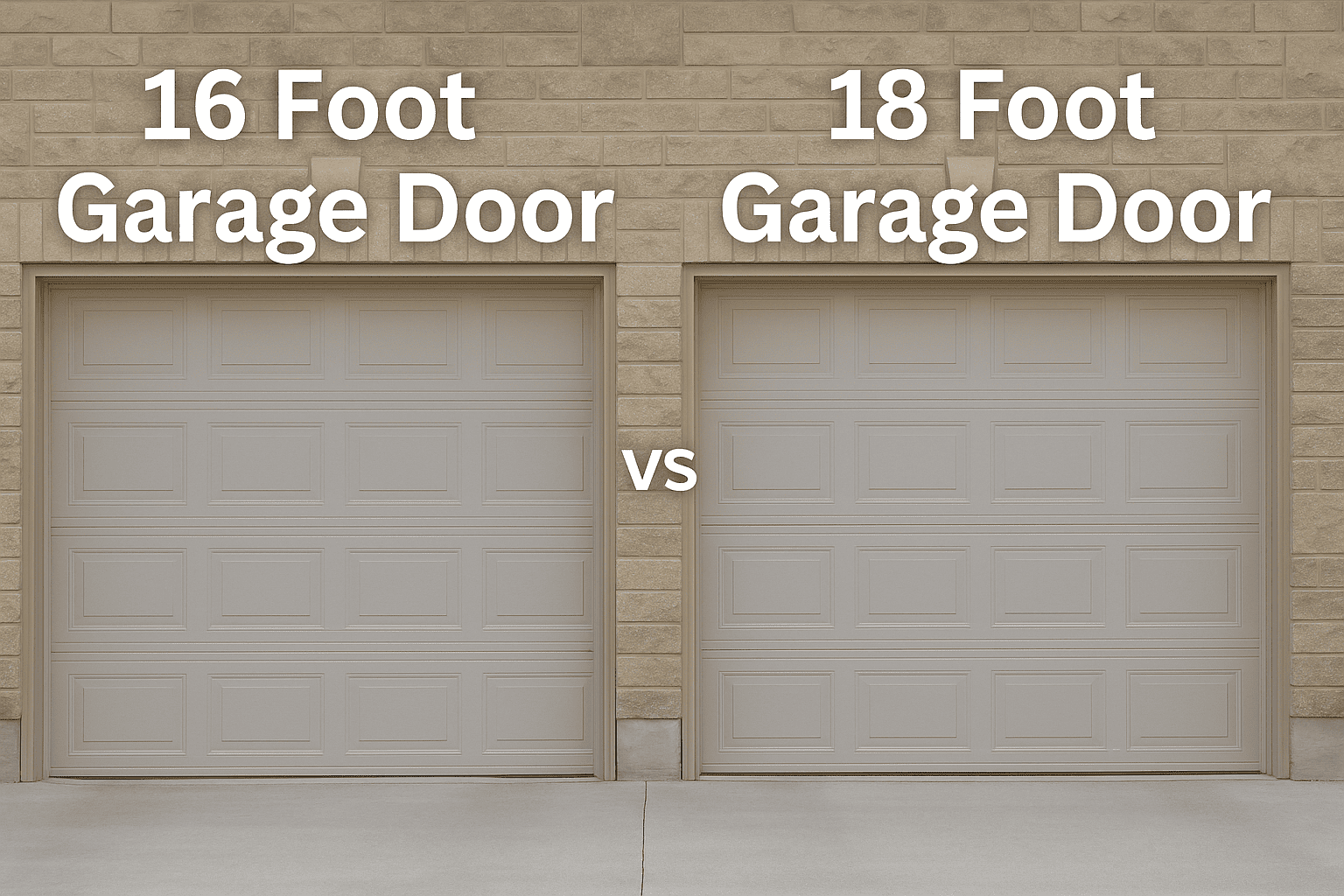Introduction
Choosing the right garage door size can be confusing, especially when comparing 16 vs 18 foot garage door options. Both sizes are popular, but they serve different needs depending on your home, vehicles, and lifestyle.
In this guide, you’ll learn exactly how to choose the best width — without guesswork or costly mistakes.
Understanding Garage Door Sizes
Garage doors come in a variety of widths, but 16-foot and 18-foot doors are the most common for two-car garages. While the difference might seem small, those two extra feet can make a big difference in comfort and functionality.
16 vs 18 Foot Garage Door: A Quick Comparison
| Feature | 16-Foot Door | 18-Foot Door |
|---|---|---|
| Width | 16 feet | 18 feet |
| Typical Use | Standard two-car garages | Oversized garages or large vehicles |
| Space Between Cars | Tight fit for SUVs or trucks | Extra room for wider vehicles |
| Cost | More affordable | Slightly more expensive |
| Aesthetic | Balanced look | More expansive appearance |
| Energy Efficiency | Easier to insulate | Slightly more air leakage potential |
Which Is Better: 16 or 18 Foot Garage Door?
When to Choose a 16-Foot Garage Door
A 16-foot garage door is ideal for:
- Standard two-car garages.
- Compact or mid-size vehicles.
- Homeowners wanting a classic look at a lower price.
Pros:
- More affordable than 18-foot options.
- Easier to find replacement parts.
- Fits most homes without major structural changes.
Cons:
- Can feel tight if you own large SUVs or trucks.
- Less room to walk between parked cars.
When to Choose an 18-Foot Garage Door
An 18-foot garage door is perfect for:
- Wide garages or homeowners with large vehicles.
- Families who need extra storage or workspace.
- Those who prefer a modern, open look.
Pros:
- More clearance and flexibility.
- Easier to park multiple large vehicles.
- Adds a premium appearance to the home exterior.
Cons:
- Costs more for materials and installation.
- May require stronger openers or reinforced panels.
Cost Comparison: 16 vs 18 Foot Garage Door
Prices vary by material, brand, and insulation level. On average:
- 16-foot door: $1,200–$2,800
- 18-foot door: $1,500–$3,500
Tip: If you already have a 16-foot frame, expanding to 18 feet may require extra structural work — increasing labor costs.
Design and Curb Appeal
Style Matters
Both sizes come in multiple styles, including:
- Traditional raised panels
- Modern glass designs
- Carriage-house styles
However, an 18-foot door creates a grander, more symmetrical look on wider homes. A 16-foot door looks balanced on medium-sized garages.
Insulation and Energy Efficiency
A larger door (like 18-foot) allows more air exchange, meaning potential energy loss.
If you live in an area with extreme temperatures, consider:
- R-Value insulation (R-13 or higher)
- Weatherstripping
- Double-layer or triple-layer construction
These upgrades improve efficiency, regardless of door size.
Suggested YouTube Video
Watch: 16 ft vs 18 ft Garage Door Comparison – Which Is Right for You?
Channel: Home RenoVision DIY
This video visually compares both sizes, showing how each looks and functions in real garages.
FAQs About 16 vs 18 Foot Garage Door
1. Will an 18-foot garage door fit a standard two-car garage?
Not always. Most standard garages are built for 16-foot doors. Expanding to 18 feet may require wall modifications or header adjustments.
2. Is an 18-foot garage door worth the extra cost?
Yes, if you own larger vehicles or want more space. The extra two feet make parking easier and can increase property value.
3. Can I replace a 16-foot door with an 18-foot one?
Yes, but consult a garage door professional. They’ll assess whether your garage can safely support the wider frame.
Conclusion
When comparing 16 vs 18 foot garage door, it all comes down to space, budget, and convenience.
If you drive compact cars and want to save money, a 16-foot door is perfect.
But if you own trucks, SUVs, or simply want extra clearance, an 18-foot door is worth the upgrade.
Ready to make your choice? Talk to a garage door installer today and see which size fits your lifestyle best. A small measurement change could make a big difference in daily comfort and curb appeal.




